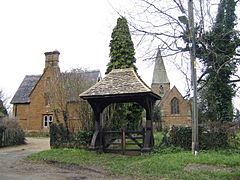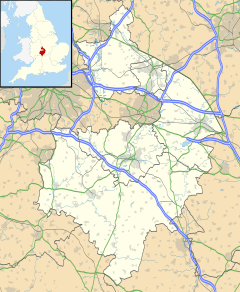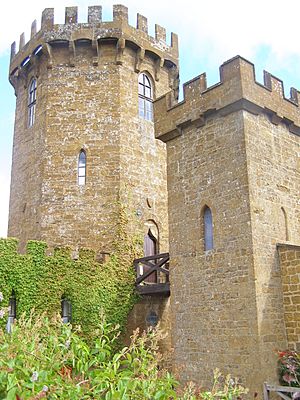Radway facts for kids
Quick facts for kids Radway |
|
|---|---|
 St Peter's parish church and Lychgate |
|
| Population | 259 (2001 census) |
| OS grid reference | SP3748 |
| Civil parish |
|
| District |
|
| Shire county | |
| Region | |
| Country | England |
| Sovereign state | United Kingdom |
| Post town | Warwick |
| Postcode district | CV35 |
| Dialling code | 01295 |
| Police | Warwickshire |
| Fire | Warwickshire |
| Ambulance | West Midlands |
| EU Parliament | West Midlands |
| UK Parliament |
|
Radway is a small village in Warwickshire, England. It is located about 7 miles (11 km) northwest of Banbury. The village sits at the bottom of Edge Hill. In 2011, about 238 people lived there.
Radway is famous for being near the site of the Battle of Edgehill. This was one of the first big battles of the English Civil War. It happened in the fields around the village.
Contents
Radway's History
The first time Radway was written about was in the Domesday Book of 1086. This was a big survey of England ordered by William the Conqueror. In the Middle Ages, the land in Radway was split between two religious houses: Arbury Priory and Stoneleigh Abbey.
Changes to Land Ownership
Later, in the 1530s, King Henry VIII closed down many monasteries. This event was called the Dissolution of the Monasteries. After this, Radway's lands were given to people close to the King. As parts of the land were sold, the old system of land ownership, called manorialism, slowly ended in Radway.
The Battle of Edgehill
The Battle of Edgehill was a very important event for Radway. It took place in 1642. This battle was one of the first major fights in the English Civil War. It happened in the fields around Radway and nearby villages.
Quakers and Emigration
After the Civil War, Radway became a center for Puritans. Some people in Radway were Quakers. They faced difficulties and some were even put in jail. Because of this, a small group of Quakers from Radway moved to a Quaker colony in New Jersey in the 1680s. Letters they sent back from New Jersey can still be found today.
Village Changes Over Time
In the 1750s, the land around Radway was "enclosed." This means that open fields were divided into smaller, privately owned farms. Later, the famous historian Sir Steven Runciman lived in Radway at the end of his life. Today, Radway also has its own cricket club.
Buildings and Architecture
Radway has some interesting buildings, including an old house and a unique tower.
The Grange House
The Grange is a large house in Radway. It was first built in the Elizabethan period as a gentleman's home. Later, an architect named Sanderson Miller changed it a lot. He rebuilt it in a style called Gothic Revival. This style made it look like an old castle or medieval building. The Grange is still a private home today. Before he became a top commander in World War I, Douglas Haig lived here. Now, it is owned by David Richards.
The Octagonal Tower
At the top of the ridge near Radway is the Octagonal Tower. This building is a "folly," which means it was built for fun or decoration, not for a practical purpose. Sanderson Miller also designed this tower. It looks like a smaller version of a tower at Warwick Castle. Since it was built, the Octagonal Tower has been a pub. It was once called the Inniskilling Dragoon, but now it is known as the Castle Inn.
St Peter's Church
The Church of England parish church in Radway is called Saint Peter. It was designed by the architect Charles Buckeridge and built in 1866. You can still see parts of an older church from the Middle Ages nearby.
Inside St Peter's Church, there are special memorials from the old church. These include a stone figure of a priest from the 1400s. There is also a memorial for Captain Henry Kingsmill. He fought for King Charles I and died in the Battle of Edgehill. The architect Sanderson Miller is also remembered here.
St Peter's Church has five bells that can be rung. They were all made in 1868. In 2015, a special exhibition opened inside the church. It is called 'The People's Struggle' and tells the story of the Battle of Edgehill and how it affected the local people. There are also audio guides in the village for visitors to learn more.
 | Chris Smalls |
 | Fred Hampton |
 | Ralph Abernathy |



